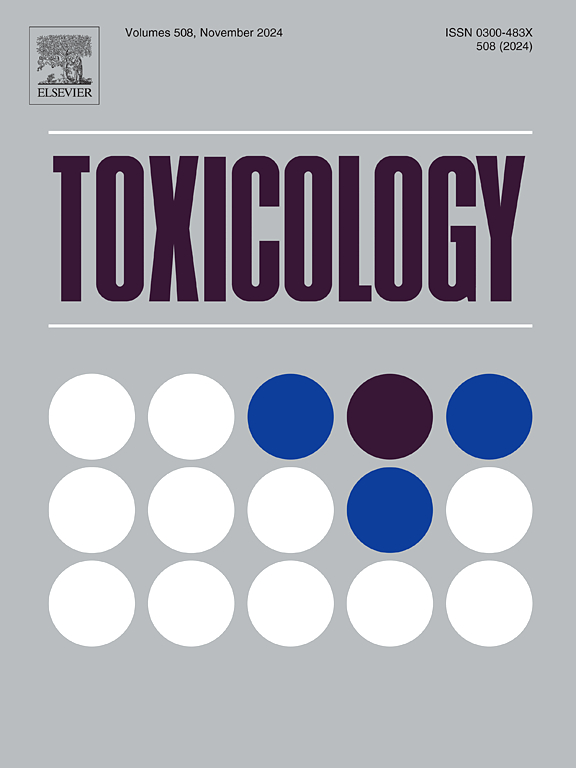Chronic oral exposure to chlorpyrifos disrupts hepatic epigenetic regulation and induces metabolic dysfunction in mice
IF 4.6
3区 医学
Q1 PHARMACOLOGY & PHARMACY
引用次数: 0
Abstract
Organophosphate pesticides (OPs) have found extensive use in agriculture due to their short half-lives and relatively low persistence in the environment. In recent years, a growing body of evidence has linked OPs, including chlorpyrifos (CPF), to endocrine, reproductive, and metabolic dysfunction, raising significant public health concerns. Although CPF has been linked to various toxic effects, the epigenetic mechanisms underlying CPF-induced hepatotoxicity remain poorly understood. In the present study, mice were orally exposed to CPF (2 or 20 mg/kg body weight), and the effects on hepatic function were assessed. CPF exposure resulted in pronounced hepatotoxicity characterized by increased oxidative stress, impaired mitochondrial function and dysregulated expression of genes involved in oxidative phosphorylation. Notably, CPF exposure significantly depleted hepatic choline levels and downregulated the expression of genes involved in the regulation of DNA methylation, including Dnmt1, Mthfr and Tet2. The decline in hepatic choline was correlated with hypomethylation of the hepatic genome in CPF-exposed mice. CPF also elevated serum corticosterone in mice, reinforcing its role as an endocrine disruptor. This hormonal disruption was associated with dysregulated glucose homeostasis as evidenced by glucose intolerance, elevated hepatic glycogen and altered hepatic expression of the glucose transporter Glut2. Together, the findings from this study provide novel mechanistic insights into the epigenetic and metabolic effects of CPF-induced hepatotoxicity.
长期口服毒死蜱可破坏小鼠肝脏表观遗传调控并诱导代谢功能障碍
有机磷农药由于其半衰期短,在环境中的持久性相对较低,在农业中得到了广泛的应用。近年来,越来越多的证据表明,包括毒死蜱(CPF)在内的有机磷农药与内分泌、生殖和代谢功能障碍有关,这引起了重大的公共卫生问题。尽管CPF与多种毒性作用有关,但CPF诱导的肝毒性的表观遗传机制仍然知之甚少。在本研究中,小鼠口服CPF(2或20 mg/kg体重),并评估其对肝功能的影响。CPF暴露导致明显的肝毒性,其特征是氧化应激增加、线粒体功能受损和参与氧化磷酸化的基因表达失调。值得注意的是,CPF暴露显著降低了肝脏胆碱水平,并下调了参与DNA甲基化调控的基因的表达,包括Dnmt1、Mthfr和Tet2。在cpf暴露的小鼠中,肝胆碱的下降与肝脏基因组的低甲基化有关。CPF还提高了小鼠血清皮质酮水平,强化了其作为内分泌干扰物的作用。这种激素紊乱与葡萄糖稳态失调有关,如葡萄糖耐受不良、肝糖原升高和葡萄糖转运体Glut2的肝脏表达改变。总之,本研究的发现为cpf诱导的肝毒性的表观遗传和代谢作用提供了新的机制见解。
本文章由计算机程序翻译,如有差异,请以英文原文为准。
求助全文
约1分钟内获得全文
求助全文
来源期刊

Toxicology
医学-毒理学
CiteScore
7.80
自引率
4.40%
发文量
222
审稿时长
23 days
期刊介绍:
Toxicology is an international, peer-reviewed journal that publishes only the highest quality original scientific research and critical reviews describing hypothesis-based investigations into mechanisms of toxicity associated with exposures to xenobiotic chemicals, particularly as it relates to human health. In this respect "mechanisms" is defined on both the macro (e.g. physiological, biological, kinetic, species, sex, etc.) and molecular (genomic, transcriptomic, metabolic, etc.) scale. Emphasis is placed on findings that identify novel hazards and that can be extrapolated to exposures and mechanisms that are relevant to estimating human risk. Toxicology also publishes brief communications, personal commentaries and opinion articles, as well as concise expert reviews on contemporary topics. All research and review articles published in Toxicology are subject to rigorous peer review. Authors are asked to contact the Editor-in-Chief prior to submitting review articles or commentaries for consideration for publication in Toxicology.
 求助内容:
求助内容: 应助结果提醒方式:
应助结果提醒方式:


